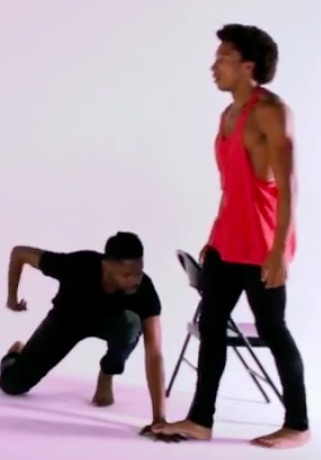The 2014 U.S. Conference on AIDS (USCA)  earlier this month was the largest HIV/AIDS-related gathering in the nation. During the conference, the AIDS.gov team provided daily social media coverage
earlier this month was the largest HIV/AIDS-related gathering in the nation. During the conference, the AIDS.gov team provided daily social media coverage  , policy updates, and technical assistance to conference participants in our social media lab.
, policy updates, and technical assistance to conference participants in our social media lab.
Today, we bring you personal perspectives of the conference from Guy Anthony, Kahlib Barton, and Patrick Ingram: three bloggers from AIDS.gov’s Black Voices Blog, a bimonthly blog series written by black, gay millennials affected by HIV/AIDS. Each is a community leader is his own right, and all of them are sharing their experiences of living with HIV by using new media to amplify their voices and touch the lives of those like them.
Guy Anthony

“…we are moving in the right direction if we continue to advocate positioning ourselves at the table when it comes to issues that directly infect and affect us.”
For a USCA first-timer like me, being amongst so many passionate people, both infected and affected, was an indescribable feeling that I’ll never forget. USCA left me reeling with excitement to return to DC to “do the work.”I was incredibly inspired to hold everyone, including myself, accountable in the fight to eradicate this disease. Not just people providing direct services to clients, but agencies as a whole, executive directors, and policy-makers.
One of my favorite moments was the workshop titled “Black Gay Men: Where Are We Now? Where Do We Need to Be?” The references to black gay revolutionaries like Audre Lorde  , Essex Hemphill
, Essex Hemphill  , Marlon Riggs
, Marlon Riggs  were inspiring. I think, as a community, we are moving in the right direction if we continue to position ourselves at the table when it comes to issues that directly affect us. And what exactly does being represented at the “table” look like? A great example is Douglas Brooks, the Director of the White House Office of National AIDS Policy; President Obama appointed him to that position earlier this year. Brooks is an HIV/AIDS activist, and a gay black man who is living with HIV. He leads the Administration’s work to reduce new HIV infections, improve health outcomes for people living with HIV, and eliminate HIV health disparities in the United States.
were inspiring. I think, as a community, we are moving in the right direction if we continue to position ourselves at the table when it comes to issues that directly affect us. And what exactly does being represented at the “table” look like? A great example is Douglas Brooks, the Director of the White House Office of National AIDS Policy; President Obama appointed him to that position earlier this year. Brooks is an HIV/AIDS activist, and a gay black man who is living with HIV. He leads the Administration’s work to reduce new HIV infections, improve health outcomes for people living with HIV, and eliminate HIV health disparities in the United States.
Overall, USCA 2014 was everything I thought it’d be. The dialogue at USCA was sincere and shared a common theme that black gay men need to start taking care of themselves, for themselves.
Kahlib Barton

“I became inspired to advocate for those who are unable to do so for themselves, because so many people advocated for me when I didn’t think I could.”
USCA  , NMAC
, NMAC  , PrEP, PEP. Alphabet soup anyone? All of these acronyms were foreign to me about a month ago. But now I not only know what they mean, but I am inspired to learn more about HIV and how I can make a difference. Because of NMAC’s Youth Scholar program
, PrEP, PEP. Alphabet soup anyone? All of these acronyms were foreign to me about a month ago. But now I not only know what they mean, but I am inspired to learn more about HIV and how I can make a difference. Because of NMAC’s Youth Scholar program  , I was able to attend USCA for the first time this year, and it has changed my life.
, I was able to attend USCA for the first time this year, and it has changed my life.
Hearing personal experiences of others living with HIV, and meeting all the NMAC Youth Scholars with so many inspiring backgrounds, were my highlight moments of USCA. Meeting these inspiring individuals who were willing to help me navigate this unfamiliar world helped me to take advantage of this opportunity.
One story that particularly resonated with me was Lawrence Stallworth; he is young, the same age as I am, and has been living with the virus for as long as I have. But until I met him, the difference between us was that he did not allow his status to define him. Lawrence has already traveled across the country speaking about HIV awareness, and now serves on the Presidential Advisory Council on HIV/AIDS.
At USCA, I became inspired to advocate for those who are unable to advocate for themselves, because so many of the people I met advocated for me when I didn’t think I could. Before USCA I was a shy, angst-ridden, 23-year-old man living with HIV. But I turned my shyness into sufficiency and my angst into assurance. Now I feel that I am empowered and ready to make a difference in my own community. I have now joined multiple councils and organizations to be sure that my voice is heard. Most important, I use my voice as my tool to combat stigma and raise awareness for all those suffering with, or because of, this disease.
Patrick Ingram
 “As I continue to grow, I realize the impact of change that takes place when I speak up…”
“As I continue to grow, I realize the impact of change that takes place when I speak up…”
I was thrilled to return to USCA this year as a member of both the NMAC Youth Scholars and the USCA Steering Committee. For me, USCA is a great opportunity to meet like-minded people who are dedicated to addressing HIV.
One highlight from my time at USCA was having the opportunity to visit the University of California at San Diego’s Center for AIDS Research (CEFAR)  with my fellow NMAC Youth Scholars. I was able to learn more about the amazing work being done in the field of HIV medications and vaccines research. Visiting CEFAR has encouraged me to continue to advocate for young, gay men of color to have access to biomedical research opportunities.
with my fellow NMAC Youth Scholars. I was able to learn more about the amazing work being done in the field of HIV medications and vaccines research. Visiting CEFAR has encouraged me to continue to advocate for young, gay men of color to have access to biomedical research opportunities.
As I continue to grow, I realize the impact of change that takes place when I speak up and set my mind to the task at hand. USCA has shown me that sharing my experiences and using my voice are important, and I continue to do so on my personal blog and in my work at the Virginia Department of Health. USCA 2015 will be held in Washington DC, and I am interested in how government agencies and organizations that serve those affected by HIV will employ, listen, give opportunities to lead, and implement the ideas/strategies of youth.
Did you go to USCA 2014? Share your experience in the comments below. Read more from our Black Voices bloggers here.
– See more at: http://blog.aids.gov/2014/10/usca-2014-reflections-of-3-black-voices-bloggers.html#sthash.gRSS3cMJ.dpuf

.jpg)
.png)


.png)






 So today is Election Day in the United States. Voting is most importantly a civic right and in many nations is required by law. It is baffling how many people complain about government and are cynical about its system; however, have never been to a community meeting or directly engaged a candidate. Let’s be real, if you are a minority, living with HIV, enrolled in public assistance programs, or not seeing issues in your community being addressed then you need to be involved. From actually running for office to just putting the candidates on the spot by asking a question like “what is your view on increasing Ryan White Funding?” we all have to understand that in order to see better results in our community we have to be engaged on multiple levels. Being engaged by vocalizing our issues, voting and most importantly making our elected officials and governments (local, state and federal) accountable for their actions is essential. Too many times we vote people in public office based off of what we wish to see, yet never follow up until we are directly affected in a negative way. If I can wake up at 4am, walk my dog, drive two hours, vote, and be back at work then you can travel 10 minutes away and vote. It is simple yet not as tedious as you think.
So today is Election Day in the United States. Voting is most importantly a civic right and in many nations is required by law. It is baffling how many people complain about government and are cynical about its system; however, have never been to a community meeting or directly engaged a candidate. Let’s be real, if you are a minority, living with HIV, enrolled in public assistance programs, or not seeing issues in your community being addressed then you need to be involved. From actually running for office to just putting the candidates on the spot by asking a question like “what is your view on increasing Ryan White Funding?” we all have to understand that in order to see better results in our community we have to be engaged on multiple levels. Being engaged by vocalizing our issues, voting and most importantly making our elected officials and governments (local, state and federal) accountable for their actions is essential. Too many times we vote people in public office based off of what we wish to see, yet never follow up until we are directly affected in a negative way. If I can wake up at 4am, walk my dog, drive two hours, vote, and be back at work then you can travel 10 minutes away and vote. It is simple yet not as tedious as you think.


 “As I continue to grow, I realize the impact of change that takes place when I speak up…”
“As I continue to grow, I realize the impact of change that takes place when I speak up…”